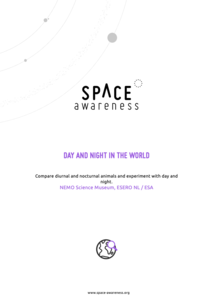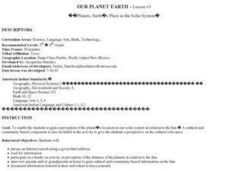Laboratory for Atmospheric and Space Physics
Where Are We Going?
Come take a ride on the space bus! Scholars go on an imaginary trip to pick up their peers from the inner and outer planets while reinforcing math skills. First, learners round decimals to identify each planets' distance from Earth....
American Museum of Natural History
Cosmic Cookies
Scholars read about each planet then bake a plate of cosmic cookies—no-bake cookies decorated to look like the planets; Mercury, Venus, Earth, Mars, Jupiter, Saturn, Uranus, Neptune, and Pluto.
Space Awareness
Day and Night in the World
How do different parts of the world experience day and night? Introduce scholars to the concept of global citizenship while teaching about animal behavior with discussion of nocturnal and diurnal animals. Then, learners complete...
K12 Reader
The Inner Planets
Here's a reading exercise that uses an article about the inner planets to assess comprehension. After reading the article, kids respond to a series of questions using information from the text.
Glynn County School System
Our Sun
The sun is responsible for almost 99 percent of the solar system's mass. As an essential part of our lives, the sun has many important features. A PowerPoint lesson presents information about features such as sunspots, the magnetic...
Curated OER
Labeling the Solar System Worksheet
In this labeling the solar system worksheet, students label the planets in a graphic of the orbits of the solar system. They also label the sun as the center of orbits.
Curated OER
Earth's Place in the Solar System
Students study and discuss the planets. They create a visual representation of the layout of the solar system and color it. They also write an informative/narrative summary report on the cultural relevance of the Sun.
Curated OER
Planets an Introduction
Fourth graders investigate one planet, enter information into a database, and print the database sorting for each of the attributes.
Curated OER
Exploring the Planets
Sixth graders explore the planets through an interactive web site. For this astronomy based lesson, 6th graders compare planets, explore comets, and discover planet facts through a variety of activities provided by the Smithsonian Museum.
Curated OER
Mercury
In this solar system worksheet, students color a detailed picture of the planet Mercury. Students answer 5 essay questions about the planet.
Curated OER
The Earth and Beyond
In this solar system worksheet, students complete 2 activities that involve ordering the nine planets and correctly placing them onto a diagram.
Curated OER
Determining distance between planets and the Sun
Students use a model to determine the distance between the sun and plants in our solar system. They determine a scale to use that represents the distance between the Earth and sun. Students calculate the scale distance that each planet...
Curated OER
Traveling the Planets!
Fourth graders research the planets and create brochures to share their information. In this planets lesson, 4th graders navigate the Internet to gather information for a brochure about an imaginary trip to their planet....
Curated OER
Galaxy Adventure
Working in groups, learners create a mnemonic device, give an oral presentation, and create a pictorial representation of the correct sequence of the planets and asteroid belt from the sun. An assessment rubric is included in the lesson.
Curated OER
Mars
After reading a short excerpt about the planet named after the Roman god of war, Mars, your class will answer four comprehension questions. The activity challenges them to fold over the paper and answer the questions without referring...
Curated OER
What's "In" There: A Study of the Inner Planets - Mercury, Venus, Earth, and Mars
First graders identify and explore the four inner planets. In this planet science lesson, 1st graders watch a PowerPoint about the planets. Students read the book Our Solar System and discuss the inner planets. Students create a book...
Curated OER
Discovering Our Planets
Fifth graders use a website to research the planets. They complete an activity sheet and discuss their planet facts. They demonstrate revolution and rotation.
Curated OER
Out of this World! 1
In this space science worksheet, students use reference books or Internet searches to find the answers to 15 questions about the solar system.
Curated OER
Inner Planets
Students create a booklet about the inner planets after researching the characteristics of each planet. Students research the following items for each planet: moons, size, rotation, orbit, atmosphere, an interesting fact. Their final...
Curated OER
Distance in Space
Sixth graders explore space science by measuring distances between planets. In this solar system lesson, 6th graders view a Bill Nye video and discover the conversion between the metric system and imperial measuring systems. Students...
Laboratory for Atmospheric and Space Physics
Space Travel Guide
Looking to take a trip? Why not go to space? Here, scholars take on the role as travel agent to create a guide to their favorite planet including travel tips and sightseeing recommendations.
Curated OER
Space Exploration to Find Habitable Planets
Students explore space science by reviewing scientific vocabulary terms. In this planet identification lesson, students identify the nine planets in our solar system and discuss which ones could potentially harbor life at some point....
Messenger Education
Look But Don’t Touch—Exploration with Remote Sensing
Mars is home to the tallest mountain in our solar system, Olympus Mons. In this set of two activities, learners review geologic land formations through the analysis of aerial maps. They then apply this knowledge to aerial maps of objects...
Star Date
Modeling the Night Sky
Dramatize the stars and planets as they become a visual representation of the solar system in this activity. Young astronomers track and simulate various constellations as they orbit the Earth to learn the position and motion of...























